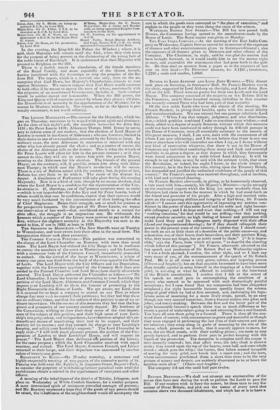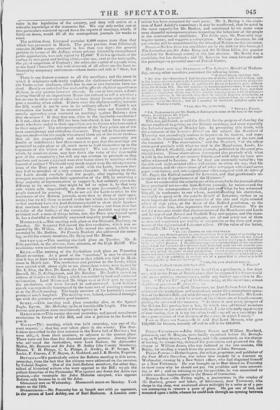REFORM Mcsrisos.—We shall not attempt any enumeration of the towns
that have met during the week to petition the Lords to pass the Bill. If our readers wish to have the names, let them turn to any Ga- zetteer of Great Britain, and pick out the names of every town that contains above two thousand inhabitants, and which has or is to have a
voice in the legislation of the country, and they will arrive at a tolerable knowledge of the numerous list. We can only notice one or two particulars scattered up and down the reports of meetings, which, if fairly set down, would fill all the metropolitan journals for weeks to come.
The petition from Liverpool contains 6,000 names more than that which was presented in March. The great petition from Edinburgh contains 36,000 names, obtained in less than two days : the general petition in favour of Mraleffrey, where private friendship strengthened public approbation, was only signed by 17,000! This is a specimen of the cooling in two great and leading cities,—the one, next to the metropolis, the grand emporium of England ; the other, the capital of a people who, as the Lord Chancellor has well observed, of all others are the least in- fluenced by temporary. excitement—whose motto and rule is " Slow, but sure."
There is one feature common to all the meetings; and the cause in which it originates sufficiently explains the slackness of attendance, as the Tories count slackness, which has in one or two instances been no- ticed. Hardly an indiei,ktarhas ventured-to (e'er the slightest opposition to Reform, in any quarter however obscure. In one or two cases, a domi- neering Sheriff or an impertinent Mayor has refused to call a meeting ; but no one in office or out of office has been found 'insane enough to op- pose a meeting when called. If there were the slightest cooling towards the Bill, would it not be seen in its ordinary effects ? Would it not strengthen the hands of its enemies ? They were not inactive six months ago—they even ventured on meetings against Reform : dare they do so now ? If they dare not, what is the inevitable conclusion ? Is it not—that since the Bill has been introduced, it has been its oppo- nents who have cooled in their opposition, not its friends who have cooled in their support ? The misrepresentations of the Tory prints are of the most contradictory and ridiculous character. They tell us that the meet- ings are small—that the people who attend them are of the lower ranks— that all the respectability and numbers of the community are hostile or indifferent : how then comes it to pass that the meetings are permitted to take place at all, much more to hold themselves up as the exponents of the wishes of the country ? We can fancy a meeting which, by numbers alone, may bear down the voice of the reasonable part of the community ; but will any one attempt to persuade us that numbers and reason conjoined were ever borne down by meetings which boasted of neither ? We should very much regret were the misrepresenta- tions of the Tory press to gain credit with the Lords• because they may lead to mistakes of a very serious character. If, relying on them, the Lords should conclude that the people, after expressing in the strongest manner possible their approbation of the Bill, by returning a large majority of representatives to support it, had suddenly grown in- different to its success, they might be led to reject it, by that very rule which calls imperatively on them to pass it,—namely, that the people demand its passing. We do not ask the Lords to trust to the statements of the Reform journals, more than to those of their oppo- nents; but we ask them to attend to tire fact which we have just stated —that nowhere have the Anti-Reformers dared to show their heads— that nowhere have they dared to raise their voices ; and from that fact to judge of the feelim::s of the country. No donbtful majority ever produced such a state of things before, nor, the Peers may depend upon it, has a doubtful or doubtfully expressed majority produills it now.
MIDDLESEX—This meeting took place at the Mermaid, Hackney, on Tuesday. Mr. Sergeant Pell moved the first resolution, which was se- conded by Mr. Wilkes. Sir John Lille moved the second, which was seconded by Mr. Bodkin. Sir Francis Burdett also addressed the meet- ing, as did the county members, Mr. Byng and Mr. Hume.
Sour awaits.—This meeting also took place on Tuesday. Mr. J. Ellis presided, in the absence, from sickness, of the High Bailiff. The resolutions were carried unanimously.
KeenT.—The meeting of the freeholders took place on Penenden Heath yesterday. As a proof of the "reaction," it may be observed that it was at least twice as numerous as that which was held in Maid- stone in March last. The resolutions and petition to the Lords, which were carried with about eight or tell dissentient voices, were moved by 31r. E. Rice, the Rev. Dr. Knox, the Hon. T. Fiennes, Mr. Hughes, Mr. Darrell, 3Ir. N. Collingwood, and Mr. Bentley. Mr. Larkin moved an address of thanks to the King; which was carried by loud and universal acclamation. Lord Mahon and Mr. Gipps were at deer post to oppose the resolutions, and were listened to and answered. Lord 3ialton's speech was repeatedly interrupted by the same sort of running. comment as at the March meeting. The happy answers of his Lordship's second produced much laughter. The meeting was, indeed, conducted through- out with the greatest possible good humour. Sunaaa—This meeting took place yesterday also, at the Spread Eagle, Epsom. Mr. Maberley spoke at considerable length. The reso- lutions and petition were unanimously agreed to. 4
HEntrFoon.—This county also met yesterday, and passed unanimous resolutions in favour of the Bill, and also a petition to the Lords to pass it.
Wiars.—This meeting, which was held yesterday, was one of the most respecte:de that has ever taken place in the county. The free- holders assembled in the first instance in the Town hall of Devizes ; but were obliged, from their numbers, to adjourn to the market place. There were not less than five thousand persons present. Among those who addressed the freeholders, were Lord Radnor, Sir Alexander Mallot, Mr. Bennett and Sir John D. Astley (the County Members), Messrs. T. H. Phipps, C. L. Phipps, J. Awdry, G. P. Scrope, W. Locke, F. Craven, J. T. Mayne, A. Goddard, and J. B. Brodie, Esquires.
DEvizEs.—We particularly notice the Reform meeting in this town, yesterday, from the fact that the citizens were addressed on the occasion by Colonel Napier. One of the Anti-Reform members, the other day, talked of historical writers who were opposed to the Bill: we pit the gallant historian of the Peninsular War against any dozen the Antis can produce,--the venerable Sir John Malcolm excepted, who opposes Reform only because he is old Sir John. Gloucester met on Wednesday. Monmouth meets on Monday. York meets on the 12th.
DostaraTinmE.—Mr. Ponsonby has at length met with an opponent, in the person of Lord Ashley, son of Earl Bathurst. A London com-
mittee has heen organized for each party. Mr. A. Baring is the chair- man of Lord Ashley's committee : it may be recollected, that he acted in the same capacity for Mr. Bankes, and sanctioned by his name some most shameful misrepresentations respecting the behaviour of the people at the nomination of candidates. The Globe says, Mr. Ponsonby may require money, and suggests a subscription. We hope the adage, his dal qui silo dot, will be remembered by the friends of Reform on this occcasion.
Pow.n.—No less than ten candidates are in the field for this boroughs ! The favourites are, Sir John Byng and Sir William Elliot, the popular candidate for Roxburgh county at the late election. Mr. Roche was a candidate, but has declined ; and Mr. Knowles has come forward under the patronage—a powerful one—of Friend Rutter.



























 Previous page
Previous page